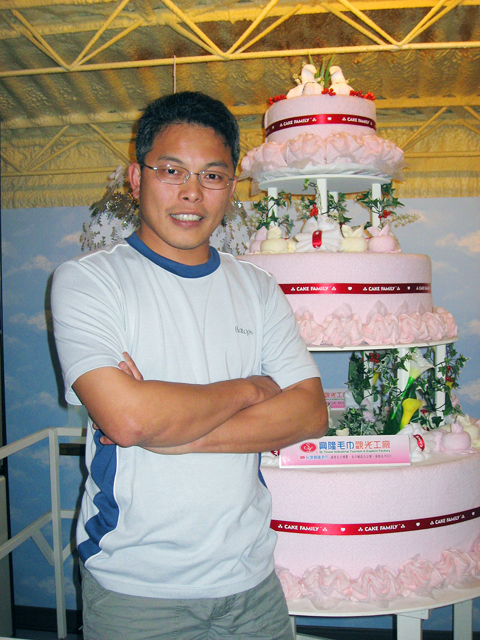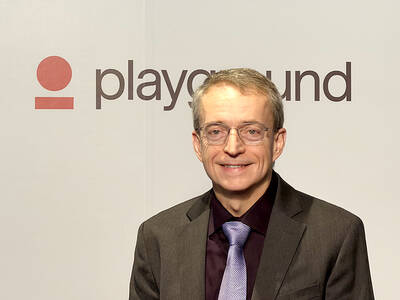Amid the protracted economic slowdown, many pundits have touted cost cutting, but 40-year-old Michael Lin (林潁穗), vice president of Huwei, Yunlin County-based Shing-Long Towel Industrial Co (興隆毛巾), said that innovation was the key to survival for the nation’s towel industry.
Lin is the brainchild behind the hot-selling Shing-Long “cake towel” — a repackaging and design idea to add value to traditional towels, which has reversed the fate of the once debt-ridden towel company that his parents founded in 1979.
The company’s newly developed “cake towel” business, launched in 2005, has helped quadruple revenues to NT$42 million (US$1.24 million) last year since 2004, when the company incurred a debt of NT$30 million.

PHOTO: JOYCE HUANG, TAIPEI TIMES
After repaying a NT$20 million debt, Lin said he believed the value-added towel business would now be the way forward for the company, although he said his old-fashioned parents still found the cake idea too fancy to sustain.
“I am sure we’re on the right track and if we miss out this time, we won’t have another opportunity,” he said.
Shing-Long is one of the remaining 50 towel companies in Huwei, down from a cluster of more than 200 before 2002, when the government opened the domestic market to low-priced China-made towels, which hurt the nation’s towel manufacturers.
“During that downturn, we managed to see a smaller-than-expected drop in sales of 10 [percent] to 20 percent, while the sales of most of our peers dropped by up to 80 percent,” Lin said.
Only when the government imposed a 204 percent anti-dumping tax on China-made towels in 2006 did domestic towel manufacturers begin to regain market share.
Today, there are about 100 towel manufacturers nationwide with an annual value of NT$5 billion, making up an 80 percent market share in Taiwan, Yunlin Towel Industrial Technology Development Association chairman Chou Ching-yuan (周清源) said.
But because of pricing, the industry has completely lost its export competitiveness, although the quality of towels made in Taiwan are much better than Chinese towels, some of which use the recycled byproducts of polluted medical waste in their cotton, Chou said, adding that his industry used to have a combined export and import value of NT$15 billion before the 1990s.
Despite the high quality of Taiwanese towels, the retail prices of Taiwan-made and China-made towels are about the same, whereas wholesale prices for Chinese towels are almost half those of Taiwanese towels because of the huge discrepancy in cost structures across the Strait.
For example, Lin said that plain-colored China-made towels cost around NT$100 per kilo, half the cost of Taiwan-made towels, which cuts into wholesalers’ profits when both are retailed at around NT$250 per kilogram.
“That is why many sales channels [once] shut Taiwan-made towels out of the market [a few years ago],” Lin said.
Chou said that the entire industry was worried about President Ma Ying-jeou’s (馬英九) plan to sign an economic cooperation framework agreement (ECFA) with China, which would allow the immediate re-entry of China-made towels. However, the industry will still have to face the threat of the re-entry China-made towels in one-and-half years time when the nation’s anti-dumping ban on the industry expires.
“We’re not afraid of competition. It’s the unfair competition that we’re concerned with,” Chou said, urging the government to clarify the trade pact’s contents.
Some Chinese towel makers used to trick consumers into believing their towels were made in Taiwan, which tainted the reputation of Taiwan-made towels because the quality of Chinese towels is mostly flawed, he said.
Several China-based Taiwanese manufacturers, such as Shan Ming Enterprise Co (森鳴實業), also suffered because domestic consumers shied away from products originating from China even though their quality was as good as their local peers, Chou said.
The chairman urged the government to advance contingency measures to protect traditional industries before signing an ECFA.
The government should strike free-trade deals with China on a sector-to-sector basis instead of signing a comprehensive pact so as to ensure that no industries suffer from the acceleration of cross-strait trade normalization, Chou said.
Lin agreed with Chou, saying the government should reinforce the towel industry’s competitiveness.
But he also said signing the trade pact with China was inevitable because the high-tech sector wanted to tap into Chinese markets.
He said he was confident that Shing-Long’s new-found “cake towel” brand would help the company avoid cut-throat price competition that would come with future imports of Chinese towels.
“The beauty of branding is that some of our customers are loyal and ask for no other brand but Shing-Long’s ‘cake towel’ for both its cute look and quality,” Lin said.
Intel Inc, the world’s largest semiconductor company, was one of many businesses that placed orders for tailor-made eight-inch “towel cakes” to give away to its top-tier business partners during its 30th anniversary in 2006. The “towel cake” business has also helped triple the 25-employee company’s profit margin to 15 percent, while creating well-paid jobs.
In comparison, a plain towel with no value-added processing only earns a 5 percent margin.
Lin, a medical laboratory science major, never thought of following in his parents’ footsteps until he took a break from his dot-com career in 2003, which turned out to be a turning point for Shing-Long.
His experience in online marketing and Web site management laid a solid foundation for him to turn Shing-Long around. He came across the cake idea by accident during a family chat and spent a month creating a feasible business plan for the concept, although Japanese cake towels also provided a reference.
He then spent days brainstorming a way to make towels look like sliced cake, Swiss rolls, lollipops, ice cream and a three-layer, 600mm birthday cake out of towels half as tall as a man to put on display.
“I enjoyed the R&D [research and development] process a lot and was deeply touched when customers told me how much they liked our products,” said Lin, who was awarded with seven patents for his products.
But, as the Japanese experience shows, some colleagues worried that the fancy “cake towel” idea might only have a product life cycle of two years, although Lin’s new business has already outlasted that cycle.
The biggest challenge for Lin is to transform his business idea into a profitable business model supported by marketing strategies and the accumulation of technical know-how so as to maintain its leading position while keeping copycats out, advised Vicky Can (甘葳璣), a senior specialist at the department of industrial technology under the Ministry of Economic Affairs.
She lauded Lin’s innovation, saying “many just can’t help but fall in love with these boutique towels.”
However, there was room for improvement because many customers still didn’t know where they could buy the company’s “cake towels,” Can said.
Nevertheless, Lin isn’t rushing toward rapid expansion, although he is thinking ahead and has hammered out three five-year plans.
Even before the current five-year phase ends, he has diversified his products to include animal images such as elephants, rabbits and crocodiles.
By refurbishing a Huwei towel factory into a dessert shop-like tourist attraction in December, Lin kick-started his second five-year plan ahead of schedule while expanding the company’s marketing and retail channels on top of bulk orders from enterprises and existing distribution points.
In the next stage, he will hold talks with neighboring manufacturers, including his hard-headed parents, in the hope of joining forces with them to turn the neighborhood into a towel park.
Like some of the nation’s high-tech parks, the towel park, if realized, will be a powerful manufacturing base and marketing stronghold for the towel industry to upgrade skills and tout both import and export business, he said.
But before that step is taken, Lin is taking time to look after visitors to his factory.
He said he couldn’t have been happier when, in front of his hand-made three-layer cake, an elderly man visiting from Tainan told his group of companions: “Come on, let’s sing Happy Birthday now” as younger women giggled and took photos by his side.
An elderly woman added: “I really want to have a piece of the cake.”

JITTERS: Nexperia has a 20 percent market share for chips powering simpler features such as window controls, and changing supply chains could take years European carmakers are looking into ways to scratch components made with parts from China, spooked by deepening geopolitical spats playing out through chipmaker Nexperia BV and Beijing’s export controls on rare earths. To protect operations from trade ructions, several automakers are pushing major suppliers to find permanent alternatives to Chinese semiconductors, people familiar with the matter said. The industry is considering broader changes to its supply chain to adapt to shifting geopolitics, Europe’s main suppliers lobby CLEPA head Matthias Zink said. “We had some indications already — questions like: ‘How can you supply me without this dependency on China?’” Zink, who also

The number of Taiwanese working in the US rose to a record high of 137,000 last year, driven largely by Taiwan Semiconductor Manufacturing Co’s (TSMC, 台積電) rapid overseas expansion, according to government data released yesterday. A total of 666,000 Taiwanese nationals were employed abroad last year, an increase of 45,000 from 2023 and the highest level since the COVID-19 pandemic, data from the Directorate-General of Budget, Accounting and Statistics (DGBAS) showed. Overseas employment had steadily increased between 2009 and 2019, peaking at 739,000, before plunging to 319,000 in 2021 amid US-China trade tensions, global supply chain shifts, reshoring by Taiwanese companies and

Taiwan Semiconductor Manufacturing Co (TSMC, 台積電) received about NT$147 billion (US$4.71 billion) in subsidies from the US, Japanese, German and Chinese governments over the past two years for its global expansion. Financial data compiled by the world’s largest contract chipmaker showed the company secured NT$4.77 billion in subsidies from the governments in the third quarter, bringing the total for the first three quarters of the year to about NT$71.9 billion. Along with the NT$75.16 billion in financial aid TSMC received last year, the chipmaker obtained NT$147 billion in subsidies in almost two years, the data showed. The subsidies received by its subsidiaries —

OUTLOOK: Pat Gelsinger said he did not expect the heavy AI infrastructure investments by the major cloud service providers to cause an AI bubble to burst soon Building a resilient energy supply chain is crucial for Taiwan to develop artificial intelligence (AI) technology and grow its economy, former Intel Corp chief executive officer Pat Gelsinger said yesterday. Gelsinger, now a general partner at the US venture capital firm Playground Global LLC, was asked at a news conference in Taipei about his views on Taiwan’s hardware development and growing concern over an AI bubble. “Today, the greatest issue in Taiwan isn’t even in the software or in architecture. It is energy,” Gelsinger said. “You are not in the position to have a resilient energy supply chain, and that,